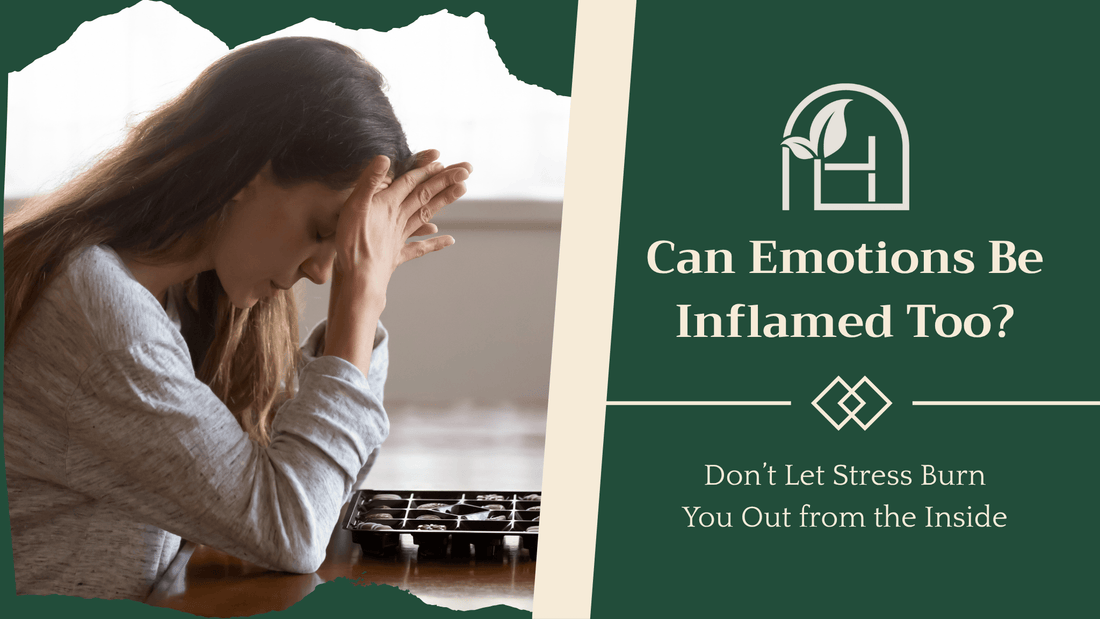
Are Your Emotions Inflamed?
Don’t Let Stress Burn You Out from the Inside
Have you ever felt like your body is on edge — tight shoulders, low energy, a racing heart — even though you didn’t do anything physically exhausting?
That’s not “just stress.” That’s your body reacting as if it’s under attack.
Because in a way, it is.
😰 Chronic Stress = Chronic Inflammation?
We usually think of inflammation as something physical — like a swollen ankle or a sore throat. But here's something most of us never learned:
Your emotions can trigger inflammation too.
When you’re under constant stress, your body doesn’t know it’s just work emails or a difficult conversation. It responds the same way it would to an infection or injury — by going into defense mode.
That means:
- Your stress hormones rise
- Your immune system gets activated
- Inflammation chemicals (like cytokines) increase
In small bursts, this is helpful. But when stress becomes chronic, that fire never fully dies out — and your health starts to suffer.
🔥 Signs Your Emotions Might Be “Inflaming” You
It doesn’t always look like a meltdown. Emotional inflammation is often quiet but persistent.
Here are some common signs:
| Emotional Inflammation Looks Like… | But Feels Like… |
|---|---|
| Snapping easily at small things | “Why am I so irritable lately?” |
| Brain fog and forgetfulness | “I can’t focus or remember anything.” |
| Always tired, even after rest | “My body feels heavy and drained.” |
| Unexplained body aches or tension | “I just hurt everywhere.” |
| Digestive issues | “My stomach is always upset.” |
| Loss of joy or motivation | “Everything feels... flat.” |
Sound familiar? You’re not alone — and it’s not “all in your head.”
Your body and mind are talking to each other, constantly.
🧘 Healing Isn’t Just About What You Eat — It’s Also How You Feel
While anti-inflammatory foods are important, emotional healing is just as powerful.
Here are a few science-backed ways to cool the internal fire:
1. Mindfulness: Noticing Without Judgment
Simply taking a few minutes a day to breathe, notice your thoughts, and pause the mental rush can lower inflammation markers in your body.
Try this: Sit quietly for 3 minutes. Breathe in through your nose. Breathe out slowly. Let your thoughts float by like clouds.
2. Meditation: Rest for the Mind
You don’t need incense or a yoga mat — just a quiet space. Meditation has been shown to lower stress hormones and reduce inflammation over time.
Try this: Use a free app like Insight Timer or Calm and start with a 5-minute guided session.
3. Emotional Support: You Weren’t Meant to Do This Alone
Talking to someone you trust — a friend, therapist, or even a support group — helps release emotional pressure before it builds up.
Connection is healing.
Remember: Asking for help isn’t weakness. It’s wisdom.
💬 A Story: When Anna Let Herself Slow Down
Anna, 35, always prided herself on “keeping it all together.” A demanding job, caring for her parents, never saying no.
But she started getting sick more often, her skin flared up, and she cried at random moments.
Eventually, she saw a therapist — something she once thought she “didn’t need.” She began journaling, meditating for 5 minutes in the mornings, and saying “no” without guilt.
Three months later, she said something beautiful:
“I didn’t change who I am. I just stopped ignoring what I needed.”
💛 Be Gentle with Yourself — You’re Already Doing So Much
If you’ve been feeling inflamed — physically or emotionally — it’s not because you’re weak. It’s because you’re human.
Healing isn’t a straight line. It’s a daily choice to listen to your body, honor your emotions, and take small steps back to balance.
So today, take a deep breath.
Put a hand on your heart.
And remind yourself: “I deserve to feel better. One calm breath at a time.”
